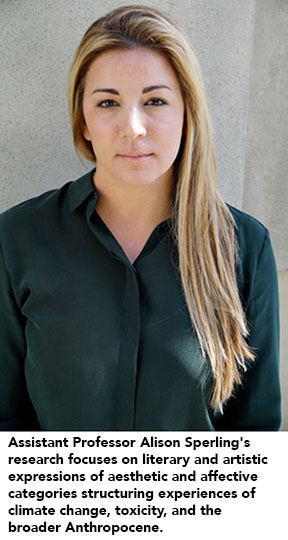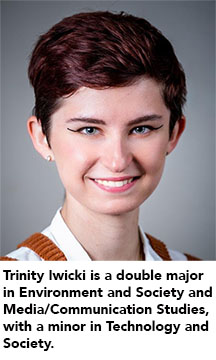English Assistant Professor Alison Sperling leads discussion for FSU Sustainable's Climate Fiction Workshop
By Alejandro Caballe
Discourse surrounding climate change has erupted over the past several decades, reaching a boiling point in recent years. As a result, climate-fiction stories have become increasingly popular, and authors have taken to writing these stories as a means of expressing their hopes, concerns, and expectations for a future impacted by climate change.
Climate-fiction is recognized as a notable sub-genre of science fiction, and Florida State University Sustainable Campus is hosting the upcoming Climate Fiction Workshop. The first event is Friday, Jan. 27, with English-Literature, Media, and Culture Assistant Professor Alison Sperling leading the discussion.
“The workshop is perhaps more about what some call ‘climate culture’ rather than only ‘climate fiction,” says Sperling, who joined the department faculty in late 2022. “That said, I hope that the workshop offers a more expansive understanding for students about what climate fiction might be and how it operates in the world.”
In general, the workshop objective seeks to educate students about the genre while also giving them resources to fine-tune their own stories. From Sperling's point of view, she wants the presentation to be discussion based with questions from the audience mixed in.
“I’ll point to the ways in which popular journalism and culture has taken up the term ‘climate fiction’ by putting pressure on the assumptions undergirding the so-called genre,” Sperling adds.
Climate activism and legislation has increasingly occupied the public conscience, leading a once-niche issue to transform into a genuine cause for concern for much of the population. FSU Sustainable Campus is known for hosting garden workdays, but the workshop is a step in a new direction.
“There’s always discussion of new events,” says Trinity Iwicki, a member of FSU Sustainable Campus and lead organizer for the workshop. They are a double major in Environment and Society and Media/Communication Studies, with a minor in Technology and Society. Iwicki hopes this workshop may, “...kickstart more creative, artistic events.”
The discussion will be guided by broader questions about the relation between climate and fiction, as well as the many ways that students from all disciplines and backgrounds have something at stake in the conversation. Climate change and the surrounding discourse, for example, are intertwined with multiple histories.
“We know that even if our understanding of climate change by way of climate science is relatively new, climate change, and therefore the stories we tell about climate change, are bound up with the histories of colonialism, slavery, militarism, agriculture, industry, extractivism, and, of course, capitalism,” Sperling says. “It seems counterintuitive, perhaps, to urge students to think against temporalities of crisis, perhaps, because of course there is a real urgency for climate action now, but if students understand these longer histories, they would hopefully come to understand and accept that there is no quick fix for them to unearth or discover but rather fundamental, often very slow change that will make a difference.”
 In addition to studying the history of climate-fiction, students will also learn about the important voices in the genre. The workshop will introduce students to theorists across a broad spectrum of studies, allowing them to expand their understanding of the fields of ecocriticism, literary analysis, and media studies.
In addition to studying the history of climate-fiction, students will also learn about the important voices in the genre. The workshop will introduce students to theorists across a broad spectrum of studies, allowing them to expand their understanding of the fields of ecocriticism, literary analysis, and media studies.
Iwicki’s position with FSU Sustainable Campus involves working on special projects, such as the Cli-Fi Workshop. They collaborated with Sperling on this event, and Iwicki hopes that workshop attendees, especially students, will come away from the session with their own ideas on how to create short climate-fiction stories, across an array of genre forms.
When students find their own voice, Iwicki says, they can subvert expectations and write climate-fiction stories that deviate from post-apocalyptic clichés.
“Pushing this hopeful narrative can be done in a similar way as the post-apocalyptic narratives,” they say. “In poetry, for example, one of the best places to start for doing something like that is by looking at what you’re fighting to protect in the first place. Building fictional worlds or metaphors from that and what could become of that, if we take steps now, is one way to do so.”
In doing so, students can become familiar with the relationship between climate and fiction across several forms of storytelling. Iwicki admits that conversations surrounding climate change can be pessimistic, a trait that they see extending into much of climate-fiction.
“You need to do research and hold onto your perspective, because it can be hard to keep that mindset in the face of everything,” Iwicki adds. “The easiest place to find motivation in your story is to know what motivates you.”
Sperling’s workshop—Friday, Jan. 27, from 3-4:30 p.m. at the Globe Room 3500—is the first of a larger series that will explore the actual creation of different cli-fi genre forms, Iwicki says. FSU Sustainable is working on confirmation for those future workshops.
Alejandro Caballe is double majoring in Editing, Writing, and Media and International Affairs.
Follow the English department on Instagram @fsuenglish; on Facebook facebook.com/fsuenglishdepartment/; and Twitter, @fsu_englishdept
